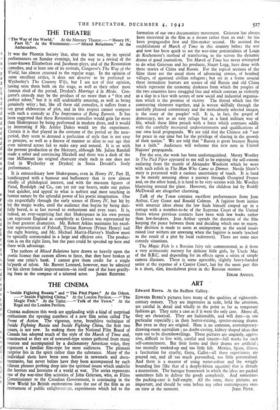THE CINEMA
" Inside Fighting Russia" and " The Pied Piper." At the Odeon. —" Inside Fighting China." At the London Pavilion.—" The
Magic Fish." At the Tatler. " Talk of the Town." At the Regal and the London Pavilion.
CINEMA audiences this week are applauding with a kind of surprised enthusiasm the opening numbers of a new film series called The Front of Action. The vigorous, terse, breathless technique of Inside Fighting Russia and Inside Fighting China, the first two issues, is not new. In making them the National Film Board of Canada has adopted much of the style of the March of Time and, constructed as they are of newsreel-type scenes gathered from many sources and accompanied by a declamatory American voice, they represent a familiar film-type for most audiences. The pleasant surprise lies in the spirit rather than the substance. Many of the individual shots have been seen before in newsreels and docu- mentaries, but never before have they been accompanied by such vibrant phrases probing deep into the spiritual issues which underlie the horrors and heroisms of a world at war. The series represents one of the war-time film activities of John Grierson, who, as Films Commissioner to the Canadian Government, is continuing in the New World his British explorations into the use of the film as an instrument of public enlightenrr.t.nt, experiments which led to the
formation of our own documentary movement. Grierson has always been interested in the film as a means rather than an end : he has been propagandist first and film-maker second. He assisted the establishment of March of Time in this country before the war and now has been quick to see the war-time potentialities of Louis de Rochemont's method of transferring to the screen the dynamic drama of good journalism. Yet March of Time has never attempted to do what Grierson and his producer, Stuart Legg, have done with these stories of China and Russia. For the topical sections of the films there are the usual shots of advancing armies, of bombed villages, of agonised civilian refugees; set in a frame around these immediate horrors are scenes of old Russia and old China which represent the economic darkness from which the peoples of the two countries have struggled free and which contrast as violently as a slap in a face with scenes of new social and industrial organisa- tion which is the promise of victory The thread which ties the contrasting elements together, and is woven skilfully through the carefully phrased commentary and the meticulously selected images, is the story of the peoples' will. It is, in fact, the gospel of democracy, not as an easy refuge but as a hard militant way of life, which these films preach with a force which contrasts oddly with the carefully measured understatements and qualifications of our own local propaganda. We are told that the Chinese ask " not for peace in our time but for the privilege of sharing in the growth of their nation." We are told that " Russia is great because Russia has a faith." Audiences will welcome this new note in United Nations' propaganda.
For the rest, the week has been undistinguished. Monty Woolley in The Pied Piper appeared to me still to be enjoying the self-esteem radiating from the mantle of Alexander Woolcott which he wore with such relish in The Man Who Came to Dinner. Nevile Shute's story is presented with a curious uncertainty of touch. It is hard to be merely amusing about a journey through Occupied France and, on the other hand, it is hard to be very serious with Mr. Woolley blustering around the place. However, the children led by Roddy McDowall are altogether charming.
Talk of the Town contains excellent performances from Jean Arthur, Cary Grant and Ronald Colman. A fugitive from justice with amateur ideas about the law finds himself cooped up in a cottage with a member-to-be of the Supreme Court of the United States whose previous contacts have been with law books rather than law-breakers. Jean Arthur spends the duration of the film keeping the peace between them and deciding which one to marry. Her decision is made to seem as unimportant as the social issues raised (our withers are unwrung when the fugitive is nearly lynched as the result of a plot by local racketeers). There are some nice comedy situations.
The Magic Fish is a Russian fairy tale commentated, as if from a very aristocratic nursery for delicate little girls, by Uncle Mac of the B.B.C. and depending for its effects upon a series of simple camera illusions. There is some agreeable, slightly heavy-handed satire at the expense of a Czarist Court, but for the most part this is a short, slim, knockabout piece in the Russian manner.
EDGAR ANSTEY.


























 Previous page
Previous page